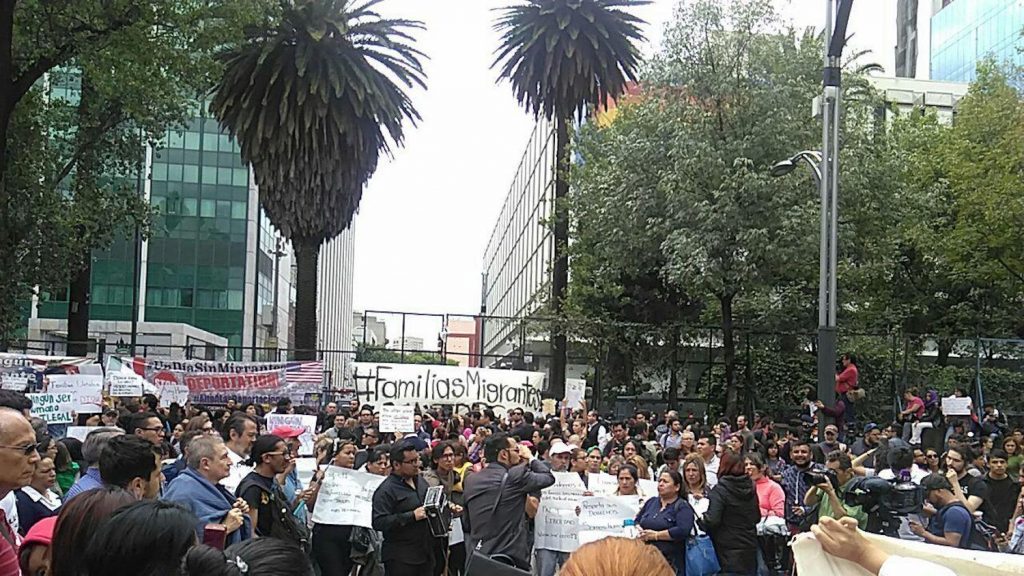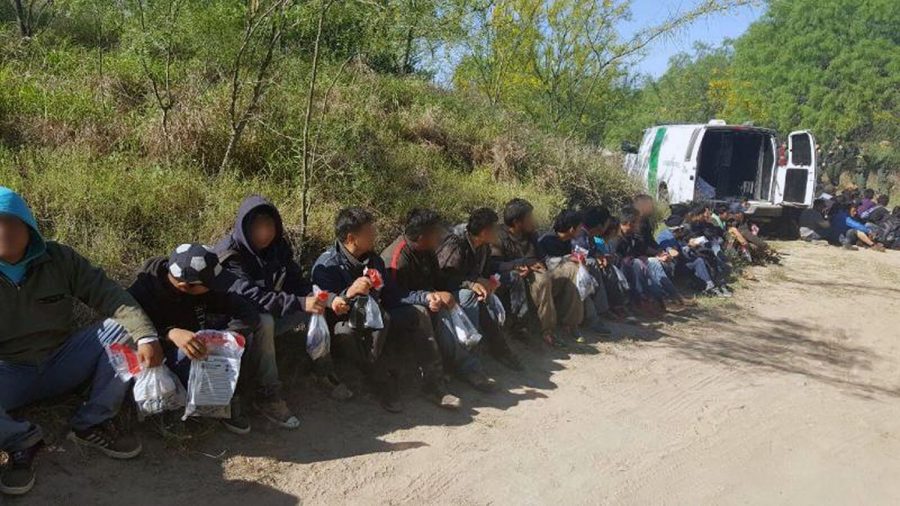The sixth season of “Orange is the New Black” ends with Blanca getting released from a private prison along with Piper and a few other characters. Her boyfriend, Diablo, is waiting for her with flowers as he watches Blanca’s friends finding comfort in the hands of their loved ones. Blanca doesn’t come out of the door like the rest of the American prisoners, and Diablo is left alone. Unlike them, Blanca exits the walls of the prison without chains only to be put into handcuffs minutes later by an ICE (Immigration and Customs Enforcement) agent because she is an ‘undocumented’.
Parallel to this, the audience is then shown shots of a corporate meeting where Linda, the vice-president of the fictional private prison company PolyCon Corrections (similar to the real life Corrections Corporation of America), presents PolyCon’s “first step into a market brimming with untapped potential”. She unveils a curtain and enthusiastically proclaims that the carceral innovation is immigrant detention centers.
The tragic love story of Blanca and Diablo seems hardly fictional in 2019. In fact, it almost seems to be a toned-down version of the much harsher reality that undocumented immigrants and asylum seekers are facing in Trump’s America.
Last June, under the banner of “Families Belong Together,” thousands of people across the US protested the family separation policy of the Trump administration along with thousands more around the world. The court-ordered deadline that was set as a response to the outrage at this inhumane immigration policy was July 26, 2018. A year has passed since I attended the Berlin solidarity protest and there are still thousands of immigrant families that are still separated. Not only that, but children are being held in horrific conditions. Warren Binford, a lawyer who interviewed children in the immigrant detention center in Clint, Texas, reported that this facility was three times over capacity — over 350 children were housed in a center intended for a maximum of 104. The children were malnourished and were given the same extremely processed food everyday. They lacked toiletries, soap, and had access only to open toilets. The children were dirty, unshowered, and at a certain point there was even a lice infestation that the guards were not dealing with.
Warren Bindford’s interview was heartbreaking. No one was taking care of these children, and they were incarcerated in prisons with conditions far worse than regular prisons solely because their parents didn’t have proper documentation for them when they crossed the border. An article from The Atlantic titled “Children Cannot Parent Other Children” notes that in these detention centers children as young as seven and eight years old are taking care of infants.
“I need comfort, too. I am bigger than they are, but I am a child, too.” These are the words of a 14-year-old Guatemalan girl.
When I read these stories, I started thinking about these children almost every time I went to take a shower, which has been about once a day because of the Skopje heat. The next ten-day forecast for Clint, Texas, shows that everyday the highest temperature gets to at least 38 degrees Celsius. To think that children are forced to endure these temperatures without being able to take showers for weeks at a time while separated from their parents, being made to sometimes sleep on the concrete floor, being malnourished, and being incarcerated, is simply too painful to imagine, let alone to experience. On top of everything, we must not forget that six children have already died in US custody since the implementation of Trump’s family separation policy. Their names and ages are:
Darlyn Valle, ten.
Carlos Gregorio Hernández Vásquez, sixteen.
Wilmer Josué Ramírez Vásquez, two.
Juan de León Gutiérrez, sixteen.
Felipe Alónzo-Gomez, eight.
The loss of these children’s lives is a tragedy that can hardly be put into words. But these children’s deaths are no accident — the detention and deaths of racialized migrant children is the logical conclusion of policies that brought aggressive immigration policies and ICE into existence, the structure and historical purpose of the American prison system, and the Trump administration’s systematic dehumanization of migrants.
In a post-9/11 world, ICE was created as a part of the Department of Homeland Security in 2003 under George W. Bush. Following him, Obama also cracked down on “illegal” immigration and deported more immigrants than any US president before him, earning him the nickname “deporter-in-chief”. While families weren’t separated in detention centers before Trump took office, his administration could build their inhumane immigration policy on the infrastructure that both a Republican and a Democratic president helped build.

However, this isn’t just about racist policies: there is a lot of money involved. In his book, American Prison: A Reporter’s Undercover Journey Into the Business of Punishment, Mother Jones journalist Shane Bauer explains that making profit through prisons in the US, whether for the state or for private contractors, has been practiced since before the abolition of slavery. While the details of the development of the prison system are too specific to explain well in an article of this length, the key aspect to understanding the rise of immigrant detention centers today is understanding the rise of the private prison industry in the 1980s with the beginning of the war on drugs. The idea of private prisons became popular as a way to supposedly save tax-payer money. In 1983, Thomas Beasly and Robert Crants formed the Corrections Corporation of America (CCA) (Bauer, 36). While CCA was initially mostly profiting from Reagan’s war on drugs, which criminalized black and brown Americans, it has since expanded its horizons and also runs immigrant detention centers. The sum of the revenues of CCA and the other big private prison company, Geo Group, was 4 billion dollars in 2017, with ICE being their biggest customer.
“They’re bringing drugs. They’re bringing crime. They’re rapists. And some, I assume, are good people.” These were the words that famously made it into then presidential candidate Donald Trump’s campaign announcement. Trump used familiar strategies to dehumanize an “out group” — since then he has even called undocumented migrants “animals”. He put emphasis on their supposed criminality and the imagined sexual deviance of the men who are an implicit threat to white American women. When starting a presidential campaign this way, it is truly no wonder that this private prison boom is happening now. There was already a political will to demonize Mexicans and other migrants by mostly white Americans who were blaming them rather than neoliberal policies for their economic losses. On top of that, there was already the carceral infrastructure and profit motive to execute that will.

As completely heartbreaking as it is, the conversation seems to be shifting at least among certain groups. New York Congresswoman Alexandria Ocasio-Cortez has called the immigrant detention centers “concentration camps” multiple times on Twitter. Since then various actions have been taken to protest these camps because Ocasio-Cortez’s nomenclature is striking. Detention centers or prisons are one thing, but what person other than an outright fascist could support concentration camps? Ocasio-Cortez’s words really mattered, and so did the many actions that followed them: shortly after, Japanese-American survivors of World War II Japanese internment camps began protesting the treatment of migrants. I have even seen my Facebook friends actively calling the detention centers “concentration camps,” and I support their taking up of this terminology. However, I had a rather unfortunate interaction with a white American who posted about this — for the purposes of this piece, we will call her Lydia. She shared this New York Times article on Facebook that talks about the conditions of the Clint, Texas detention center that I mentioned earlier. Lydia added a comment which said “*concentration camps” as a correction to the NYT piece i.e. her message was that these immigrant detention centers should be called out for what they are — something I agree with.
“I am sorry but don’t come here you know the consequences [sic],” commented Lydia’s relative, whom we will call Carol, on the post Lydia shared.
“I’m sorry but human rights abuses should not be happening in the ‘land of the free’ [sic],” Lydia fired back.
“So the consequences for literally seeking asylum from persecution should be being put in a fucking concentration camp??” I was compelled to comment because Carol’s lack of empathy simply made me so mad. I was expecting that Lydia would support my rightfully angry reaction, but instead she commented this:
“Please don’t curse at my relatives. I don’t share their views at all and it breaks my heart and makes me mad that such caring people who love their family so much can have so little empathy and consideration for the children of others, but cursing at people online isn’t going to change anything either.”
Lydia’s reaction almost shocked me more than Carol’s comment. She wrote a comment that strongly reprimanded me for my use of a swear word — someone who probably shares many of her views — rather than trying to argue more with a relative who had no problem with children, who almost certainly had no choice in the matter of leaving their home countries, being forced to go weeks without showers. I wasn’t even cursing at or trying to personally insult Carol, but rather I was expressing genuine anger at the casual way in which Carol blamed the children for becoming victims of torture. As much as Lydia cared for the supposed well-being of these children, in this social media exchange she seemed to care about her white relative more. Though Lydia was horrified at the conditions of these camps, she didn’t seem truly willing to have a tough conversation with an arguably racist relative who was at the very least complacent with children as young as a few months old being kept in concentration camps — at least not online, on a public platform, where such a conversation could be broadcast to others and thus have a wider-reaching impact. In that moment, Lydia decided to put white feelings before the lives of brown children and she expressed it by asking me to “engage in civil discourse” rather than understanding why I might have such a reaction to someone who was being a fascist apologist in that moment.
While there is much to be done both in the short term and in the long term, a clear step that many concerned Americans can take is to have uncomfortable conversations with their relatives who support these inhumane detention policies. If people like Carol, who Lydia claims are compassionate in other contexts but not this one, approve of children being literally put in concentration camps, then that gives licence to the Trump administration to continue their cruel policies. People like Carol are actively dehumanizing racialized children and their parents, and people like Lydia should try their hardest to change their minds so as to not give more fuel to ICE and the Trump administration. And if the Carols won’t listen (or even if they do), then the Lydias should put all of their effort into activism and resistance. In the short run, they can urge for immediate changes, such as 2020 presidential candidate Julian Castro’s suggestion to eliminate section 1325 in US immigration law that criminalizes undocumented immigrants who do not enter the US at legal ports of entry to seek asylum. Though seeking asylum is legal, crossing the border in this way is a criminal federal offence which gives ICE the legitimacy to incarcerate asylum seekers. Castro’s proposal would make crossing the border without proper documentation only a civil offence rather than a criminal one — I would argue that this would be a prison abolitionist reform. In the long run, though, there need to be profound systemic changes, such as working on abolishing ICE, creating pathways to citizenship for migrants, forging a humanizing discourse about migrants, and, of course, working on abolishing the for-profit prison system in the US.
All of that said, the most immediate action any concerned American (or non-American) can take is attend a Lights for Liberty protest on the 12th of July. They will be organizing what they call “vigils to end concentration camps” all across the US and around the world. In fact, Democrats Abroad, The Coalition Berlin, and American Voices Abroad Berlin are organizing such a vigil at Pariser Platz in front of the US Embassy on Friday, July 12th at 7 pm.
Notes:
[*1] Shane Bauer. American Prison: A Reporter’s Journey Into the Business of Punishment. New York: Penguin Press. 2018. Print.

